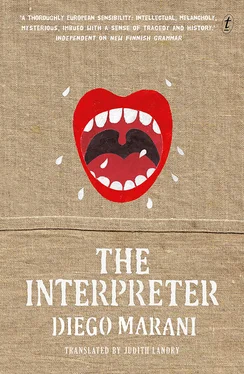Her relationship with the furniture that she brought home varied from piece to piece: each one had its own character, and Irene knew how to bring it out. She would introduce them to me like silent relatives who were coming to stay. I always found them faintly disquieting; it seemed to me that they did indeed hold something living prisoner within their boards, and often it would occur to me that perhaps I too had become one of them, an old chest of drawers forgotten in some junk shop, and that Irene had chosen me in the same way, touching me, sniffing me, running her hands over my old frame and finding it to be that of a seasoned loner. Yet for me, the presence of their austere forms in that house were so many pointers to Irene’s own presence, which was as solid, antique and immutable as their carved wood. Irene and I had lived together for so long that by now she felt like one of my own internal organs. Somewhere within me, there she was, pulsating along with the rest, and our everyday life slid past, as untroubled as a landscape viewed from a train, becoming gradually cluttered up with holiday photos, clothes inevitably soon out of fashion, phases that gently coalesced, memories that could be either hers or mine. But all this was doomed inexorably to end. An invisible worm was silently devouring us from within: beneath the lustrous shell of our apparent happiness, of that precious, ever stronger bond we believed time to have forged between us, all that was left was dust.
One evening during that dismal spring, catching me looking sadly out of the window at my blighted tulips, Irene had come up to me and put her arms around my waist. ‘Your roses will make up for them!’ she whispered in my ear. I smiled at those words of consolation, but instead of joy, what I felt within me was the cold breath of an unknown fear. A touch of lassitude had crept into her voice, a resigned wariness. At that same moment a brief, light shower of rain spattered the gardens, and an unexpected shaft of sunlight turned the thousand drops upon the window panes an orange-yellow. For some time — as the blue night fell upon the rain-soaked city and entered our friendly house, swelling the shadows and blurring our faces — I held her in my arms.
Over those days — now splintered into a thousand fragments — I was beginning my new job as head of the interpreters’ department. It was a world I hardly knew, quite different from that of the administrative duties I’d previously carried out. Geographically, the offices of the conference section of the international body for which I was now working were in something of a backwater, housed in a green suburbia of neat modern roads, in a spacious park, so that my little white building at the end of an avenue of maples looked like a clinic, a sanatorium housing the sufferers from some rare but not dangerous disease. And, truth to tell, working among interpreters, I did indeed feel that I was dealing with ‘sufferers’, beset by some mysterious unease. Their troubles usually took the form of a garrulous euphoria, but also sometimes that of a scabby touchiness, like an internal itch that could never be assuaged. Without knowing any of them personally, I had learned to distinguish them from among the anonymous crowd of functionaries. In the canteen, in the bar, in the local restaurants, in the entrance halls of our various offices, they formed small groups of wildly gesticulating, wild-eyed individuals, endlessly prattling, leaping from one language to another like acrobats, sometimes prone to fitful movements, reminiscent of those made for no apparent reason by a fish or bird. They did not seem to engage in conversations, I didn’t feel that they listened to one another. Their talk had an overenthusiastic quality about it, like that of witch doctors who are using the word to keep themselves in a state of trance. I came to see that they had a horror of silence; they seemed to stiffen in alarm whenever they sensed that it was about to descend upon them. They fended it off with an animal instinct, clustering in noisy packs. Even when meetings went on until late at night, and in the breaks when I would come upon them at the counter in the bar, bleary-eyed and drowsy, there was always one who would carry on gabbling, keeping the fire of the word alive so as to ferry his companions out of that cold and silent hour. The others would listen to him trustingly, abandoning themselves to his voice as though to a life-saving raft.
In my heart of hearts, I’ve always had trouble with polyglots. Above all, because those who vaunt a knowledge of many languages have always struck me as show-offs. No human being can really be capable of speaking the tongues of so many others equally well; anyone venturing to do so is embarking on an unhealthy exercise which can only lead to mental instability. The only foreign language known to me is an inadequate and obsolete German, acquired willy-nilly at grammar school. My father’s mother tongue has never put down roots in me; if I can still drag up some stilted phrases, this is not because I practise it or take care to keep myself updated in this tongue that I find so antipathetic, but simply because — behind the hazy memory of rules learned off by heart, like answers at a catechism class — I can still hear my father reproving me in his own exasperated German. I hear my teacher imperiously summoning me to the blackboard for questioning, browbeating me, ordering me to speak German, as a soldier might be ordered out of a trench to go on the attack. It matters little that the threat has passed; the fear remains; only such fear could induce a man to leave his own mind unguarded to pursue words that are not his. Languages are like toothbrushes: the only one you should put into your mouth is your own. It’s a question of hygiene, of good manners; it’s dangerous to let yourself be contaminated by the germs of another tongue. What do we know about what might be unleashed when they slip into the delicate vessels of our brain, when they mingle with our most ancient juices and generate some hybrid that God never intended? The germs of European diseases did for the American Indians. Similarly, a foreign language injected into our mind brings with it the taint of unknown sounds, a vision of worlds that are incomprehensible to us — the lure of other truths and a devilish desire to know them.
That was why I was alarmed by the swarm of ranters I was now being called upon to manage. They were people who challenged God, who, out of sheer devilry and vanity, would lean forward to peer into the abyss of madness. They struck me as circus performers, shifty, dishonest quick-change artists, mental stuntmen, who at any moment might put a foot wrong and take a serious fall. In truth, if I had agreed to go and run the interpreters’ department, it was simply because I felt I should do my superiors’ bidding. None of my colleagues wanted that thankless task, no one wanted anything to do with that horde of touchy, lying prima donnas. But I, with the vague promise of some more prestigious future post, had allowed myself to be persuaded. I hadn’t managed to say no. Even Irene said I was a fool. She accused me of going to the office as to a barracks, of performing my job like some blinkered soldier, who carries out the most fatuous corvée without batting an eyelid. She was right. I wore my grey functionary’s suit like a uniform; I was proud of my soldierly career as an anonymous executive. In my Spartan office, amidst the metal furniture and two-tone filing cabinets, I felt safe from the capricious world outside. I was fond of my office and its shabby furnishings; what I liked about it was that it had no history, no character, it was not even mine. It could be taken apart and put up again in a thousand other places without ever absorbing anything of the humanity amidst which it stood: the complete opposite of Irene’s furniture — laden with suffering, blackened by time and shot through with dead voices which, on certain nights, I felt I could hear emanating from the wood and peopling the house with ghosts, with lost souls, forever held back by time’s stealthy undertow. Whereas, in my own office, nothing ever happened which wasn’t caused by me. Everything had its routine, everything was governed by iron rules which protected me from the humiliation of doubt. Safe in my glass barracks, I commanded a gigantic army, with rows of string-bound files in place of tanks, and reams of paper doing duty for bombs, capable of destroying men and things in total silence. I did not know that what would be destroyed — by the few fussy, handwritten lines on a piece of lined paper referred to as Report 99/5162, which I found on my desk that windy March morning — would be me.
Читать дальше












